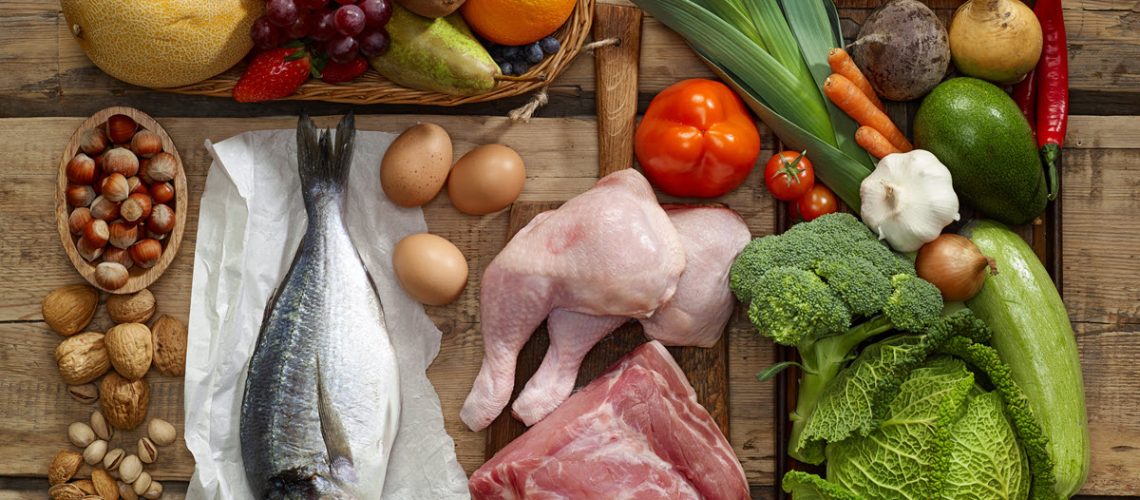Also known as the hunter-gatherer diet and the caveman diet, the paleo diet focuses on the idea that our genetics and anatomy have changed very little since the Paleolithic period. Therefore, eating a diet closer to what our primitive ancestors ate is more aligned with our genetics, and thus better for our health. Limiting food choices to what could be hunted or gathered in the Paleolithic period, mainly meats, fish, and certain fruits and vegetables, the paleo diet virtually eliminates foods that stem from the agricultural revolution, such as grains, dairy, and legumes.
In any case, going on a paleo diet encourages you to eat more healthily and pay more attention to where your food is sourced. In many cases, it could even help you lose weight and benefit your overall health! Let’s take a closer look at how the paleo diet works and why it’s one of our favorite diets.
How the Paleo Diet Works
The way the paleo diet works is by helping us revert to a more primitive diet better suited for early humans. The main reasoning behind this is that our bodies are genetically mismatched to our modern-day diets. Most of what we eat nowadays is a result of the popularization of farming practices around 10,000 years ago, which introduced foods such as dairy products, grains, bread, and legumes as dietary staples. The introduction of these foods, in turn, came quicker than our ability to adapt to them and is believed to play a role in modern-day health concerns like obesity, diabetes, and cardiovascular disease.
Instead of relying on farmed and processed foods, the paleo diet focuses on food that was once obtained by our ancestors through hunting and gathering. This includes lean meats and fish, as well as nuts, seeds, and low-glycemic fruits and vegetables.
What to Eat and What to Avoid on the Paleo Diet
The paleo diet is a high protein, moderate fat, low carbohydrate, high fiber, and low sodium and sugar diet. Fats in this diet consist mainly of unsaturated fats, such as those found in fish, avocadoes, nuts, and seeds, and carbohydrates are limited to low-glycemic index carbohydrates. For instance, despite potatoes being historically available during the Paleolithic period, they are typically avoided while on the paleo diet due to their high glycemic index. Non-starchy vegetables like broccoli, carrots, and cucumbers, however, are perfectly fine to eat on the paleo diet.
As far as proteins go, many tend to emphasize lean, grass-fed meat over conventional grain-fed meat, since it’s a good source of protein and lower in saturated fat. Grass-fed meat is also a good source of omega-3 fats. Pound for pound, however, oily fish like salmon offers a much higher concentration of omega-3 fats than beef and other lean meat, which is why some might recommend limiting red meat intake and opting for fish instead.
Naturally, processed foods are to be kept to a bare minimum due to the diet’s emphasis on fresh foods. Some exceptions can be made, however, for things like frozen fruits and vegetables. Other foods to avoid include grains like wheat and barley, dairy products, refined sugar, salt, and legumes like beans, lentils, peanuts, and peas.
Can the Paleo Diet Really Help You Lose Weight?
When compared to other popular diets like the Mediterranean diet or the NNR diet, some studies have shown the paleo diet to be an effective way of losing weight, lowering blood pressure, and improving cholesterol levels. Overall, the majority of clinical trials so far suggest that a paleo diet may provide certain benefits, but this doesn’t mean that it’s for everyone. As with any diet, whether the paleo diet is suitable for you depends on a wide variety of factors and you’re better off following the advice of a nutrition specialist.
If you’re looking to help to lose weight and keep it off, get in touch with our Calgary weight loss clinic today. We offer personalized metabolic balance programs based on your blood work and tailored to your personal food preferences. Reach out to us today at 403-202-7272 or contact us online to book your initial consultation and find out more about how we can help you achieve your health and weight loss goals.



